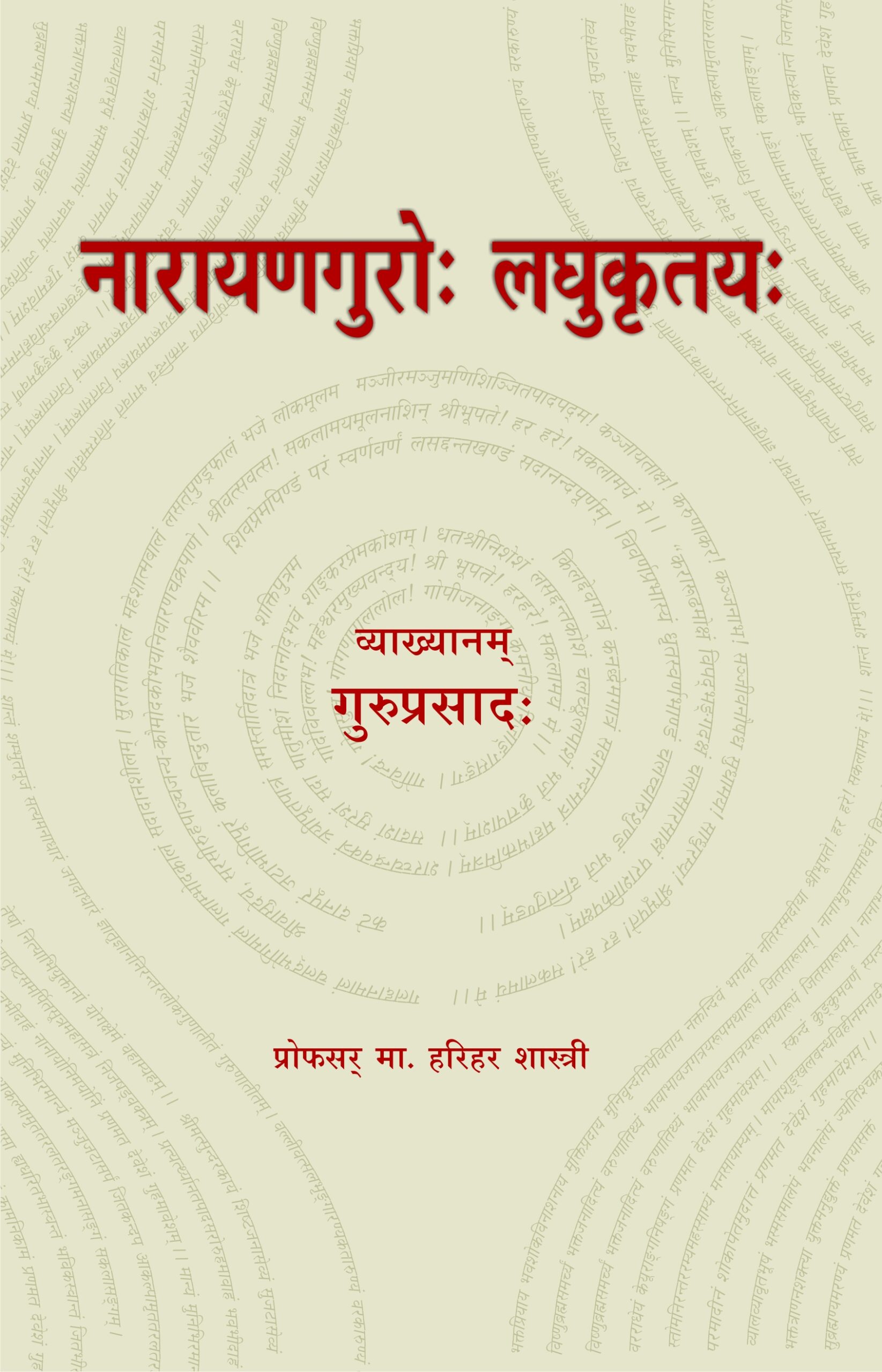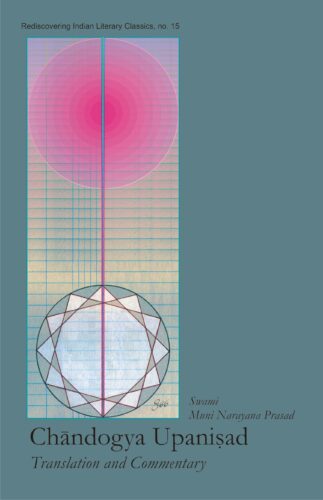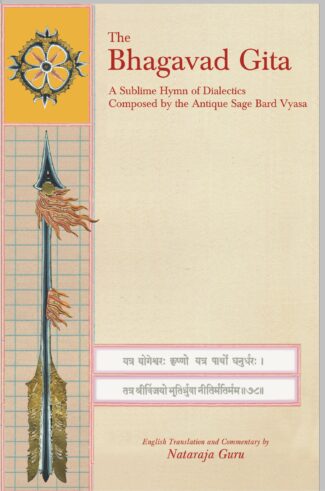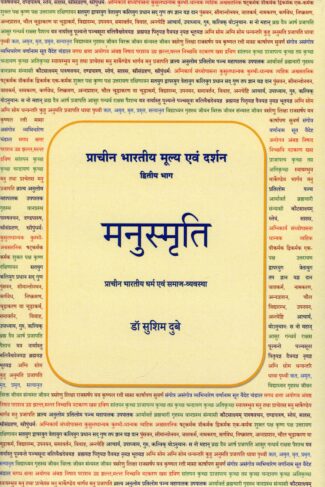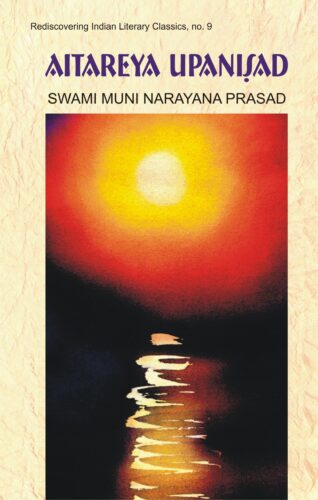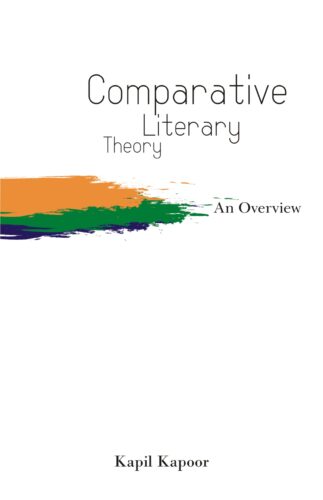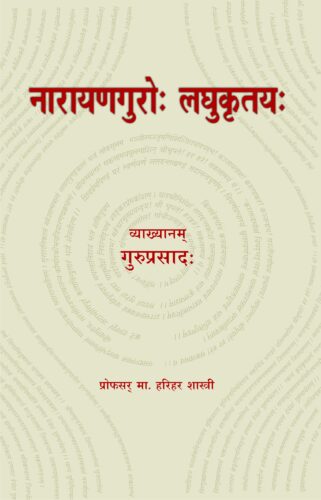
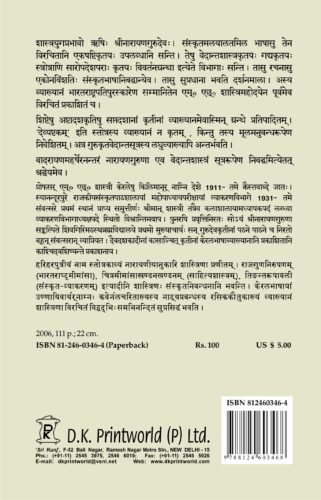
Narayanaguru Laghukr...
Narayanaguru Laghukrtiyah
by: M. Harihar ShastriThe book written in Sanskrit with original verses, provides details of shorter works of Narayana Guru, a great poet of southern India. Comprising 17 chapters, it highlights his anthologies in praise of Lords Ganapati, Subrahmanya, Siva, Visnu, etc.
₹100.00 Original price was: ₹100.00.₹90.00Current price is: ₹90.00.
ISBN: 9788124603468
Year Of Publication: 2006
Edition: 2nd
Pages : 111
Language : Sanskrit
Binding : Paperback
Publisher: D.K. Printworld Pvt. Ltd.
Size: 22 cm.
Weight: 200
The book written in Sanskrit with original verses, provides details of shorter works of Narayana Guru, a great poet of southern India. Comprising 17 chapters, it highlights his anthologies in praise of Lords Ganapati, Subrahmanya, Siva, Visnu, etc.
- Sale!Chandogya Upanisad Translation and Commentary by: Swami Muni Narayana Prasad
₹1,350.00Original price was: ₹1,350.00.₹1,215.00Current price is: ₹1,215.00.Chandogya is the most intriguing of all the Upanishads. It begins with directing the priests of a Soma-yaga to see the hidden wisdom-significance in what they perform and recite as a brute ritual. This sublimating of ritualism gradually leads us to perceiving the entire life system as a yaj¤a held in and performed by Brahman. The next step this perception leads us to is “sarvam khalvidam brahma” (everything here indeed is Brahman). Then the enquiry as to what this Brahman is, begins. The answer we arrive at is “tat tvam asi” (That thou art). Finally we realize “atmaivedam sarvam” (atma indeed is everything here, or myself indeed is everything here). From this self-identity with “everything,” with Brahman, we never return to our identity with individuated forms pertaining to the world of becoming. The present commentary explicates in a lucid way how thinking progresses in this Upanishad, along with unravelling its schematic, structural and dialectical intricacies, both subjective and objective, both universal and particular.
- Sale!Bhagavad Gita by: Nataraja Guru
₹850.00Original price was: ₹850.00.₹765.00Current price is: ₹765.00.Nearing its fiftieth year of being continuously in print, Nataraja Gurus monumental analysis of one of the greatest philosophical classics of Planet Earth is now available in a new edition. Generations have benefited from its unique angle of vision, which introduces a universal framework that does not depend on faith to impart its message of infinite potential for every human being. The Gurus wry humor, fresh insights, and fearless challenges to prevailing orthodoxies, are clear marks of his style. His analysis is radical by any measure, yet it must be noted that much of the scientific and philosophic community has evolved over the same half century toward a similar global, broad-minded outlook to the one which the Guru brings to bear in these pages, and which not coincidentally is advocated by the Bhagavad Gita itself.
- Sale!Manusmriti-Prachina Bharatiya Mulya evam Darshan (Part 2) by: Sushim Dubey
₹850.00Original price was: ₹850.00.₹765.00Current price is: ₹765.00.“प्रस्तुत ग्रन्थ प्राचीन भारतीय मूल्य एवं दर्शन शृंखला के द्वितीय भाग है। मनुस्मृति प्राचीन भारतीय धर्मशास्त्र परम्परा का आधारभूत ग्रन्थ है। भारत का प्राचीन धार्मिक इतिहास सामाजिक संरचना, राजनीतिक मान्यताओं इस ग्रन्थ में जो प्रतिनिधिक वर्णन मिलता है।
मनुस्मृति मूल रूप से आध्यात्मिक मान्यता परक ग्रन्थ रहा, जिसमें कालक्रमः से समाज.व्यवस्था, वर्णव्यवस्था एवं अनेकानेक बातें समाहित होती चली गईं। तथापि मनुस्मृति की सर्वोपरिता आर्यवर्त में सहसीरों वर्ष तक निर्विवाद रही। धर्म, कर्म, कर्तव्य, सूतक, प्रायश्चित्त एवं संस्कार आदि के लिए आज भी स्रोत ग्रन्थ के रूप में मनुस्मृति संदर्भ ग्रन्थ है।” - Sale!Aitareya Upanisad by: Swami Muni Narayana Prasad
₹110.00Original price was: ₹110.00.₹99.00Current price is: ₹99.00.Yet another masterly piece of Hindu spiritual wisdom, Aitareya essentially reinforces the grand Upanishadic message which is neither a picturesque mythology nor a promise of heaven nor a threat of hell. It is yet another reminder (from the ancient seers) of our cosmic connection showing how this universe, this phenomenal world of ours, and all that is created, whether movable or immovable, are unfolded from one primeval casual Reality: atman, variantly called the Supreme Spirit, Pure Consciousness or Prajnanam Brahma; and how, in turn, atman perceives itself as the one underlying substance of all these phenomena. A distinguished exponent of Vedanta, Swami Muni Narayana Prasad reinterprets this Upanishad, developing refreshing insights into its textual discourse, its meaning, and its message. Also included in this critical commentary are its original Sanskrit text, Romanised transliteration, and verse for verse English translation. Appended to the Rigveda, Aitareya Upanishad comprises three chapters (IV-VI) of the Aitareya-Aranyaka which, in itself, is a continuation of Aitareya Brahmana. And as one of the principal Upanishads is invaluable as much to the discerning readers as to the scholars of Indian philosophy.
- Sale!Comparative Literary Theory by: Kapil Kapoor
₹800.00Original price was: ₹800.00.₹720.00Current price is: ₹720.00.“Two cultures of the world — Greek and Indian — have nourished literature. While the contemporary Western thinking is rooted in Greek thought, especially of Socrates, Plato and Aristotle, and percolated down to the modern European languages with the advent of Christian thought, the multilingual Indian literary tradition has its base from the classical Tamil, Pali, Prakrt and Sanskrit.
Though cultural specificity marks these two traditions off from each other, the universal human condition that finds expression in all literatures binds them together. This book delves deep into the growth of poetics, theory of literature, literary artefacts, aesthetics of literature as an art form, and dramaturgy and philosophy of literature.
Cultures have given forms as their typical expressions — for India great epics, for Greece tragedies, and for England lyrics. Similarly, different ages of a culture find expression in different forms — Elizabethan age of England in lyrics, sixteenth-seventeenth centuries in drama, eighteenth century in prose, and nineteenth century in novel. India’s genius is in epics and its expression unfolds in sravya-preksa compositions, being singable poetry as its preferred form.
This book must serve pretty useful for students and teachers of literature. Also, an invaluable collection for researchers in literature.”


